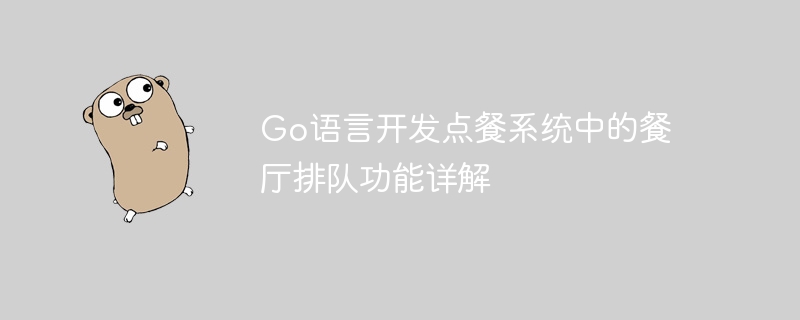

Detailed explanation of the restaurant queuing function in the Go language development ordering system
The restaurant queuing function is an indispensable part of the modern ordering system. This feature allows customers to order in advance without waiting for a table, and then arrive at the restaurant to pick up their food at a designated time. This can not only improve the efficiency of the restaurant, but also reduce customer waiting time and enhance the customer's dining experience. This article will introduce in detail how to use Go language to develop a restaurant queuing function, and attach specific code examples.
Before we start developing the queuing function, we first need to analyze the requirements. The queuing function mainly includes three aspects of needs: ordering, picking up meals and queuing. The ordering function allows customers to pre-select dishes, specifications and quantities through the system at a designated time point, and pay for the order. The meal pickup function means that after customers arrive at the restaurant at the scheduled time, they go to the designated meal pickup area to pick up their meals. The queuing function is to queue customers in order according to their arrival time to ensure the order of picking up their meals.
In order to implement the queuing function, we first need to design the corresponding data model. In this ordering system, we can use two data structures to represent customers and orders. The customer's data structure can contain basic information such as the customer's name and phone number, and the order's data structure can contain information such as the order number, ordered dishes and quantity.
The following is a simplified code example:
type Customer struct {
Name string
Phone string
Order Order
}
type Order struct {
ID int
Items []Item
}
type Item struct {
Name string
Quantity int
}In the Go language, we can use slices to represent a queue. To implement the queuing function, we can create a slice and then add customers to the end of the queue. When a customer picks up their meal, we can remove them from the queue.
The following is a simplified code example:
func main() {
var queue []Customer
// 添加顾客到队列末尾
func addToQueue(c Customer) {
queue = append(queue, c)
}
// 从队列头部取出顾客
func removeFromQueue() {
if len(queue) > 0 {
queue = queue[1:]
}
}
}In order to implement the complete restaurant queuing function, we also need Consider the process for customers to order and pick up their food. When a customer orders food through the system, we can create a customer object and add it to the queue. When customers arrive at the restaurant, pick up their order in the designated pickup area and then remove them from the queue.
The following is a simplified code example:
func main() {
var queue []Customer
func addToQueue(c Customer) {
queue = append(queue, c)
}
func removeFromQueue() {
if len(queue) > 0 {
queue = queue[1:]
}
}
// 顾客点餐
func placeOrder(c Customer) {
// ... 顾客点餐逻辑
addToQueue(c)
}
// 顾客取餐
func collectOrder() {
// ... 顾客取餐逻辑
removeFromQueue()
}
}By using slices in the Go language, we can easily implement the restaurant queuing function . In this article, we detail how to design the data model, implement queuing functionality, and provide complete code examples. I hope this article will be helpful to developers who are developing restaurant ordering systems.
The above is the detailed content of Detailed explanation of the restaurant queuing function in the Go language development ordering system. For more information, please follow other related articles on the PHP Chinese website!
 Usage of Type keyword in Go
Usage of Type keyword in Go
 How to implement linked list in go
How to implement linked list in go
 What are the Go language programming software?
What are the Go language programming software?
 How to learn go language from 0 basics
How to learn go language from 0 basics
 What are the methods to implement operator overloading in Go language?
What are the methods to implement operator overloading in Go language?
 What are the operators in Go language?
What are the operators in Go language?
 mysql engine introduction
mysql engine introduction
 How to turn two pages into one word document
How to turn two pages into one word document